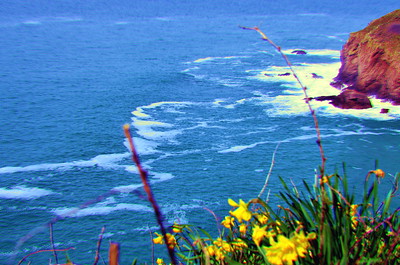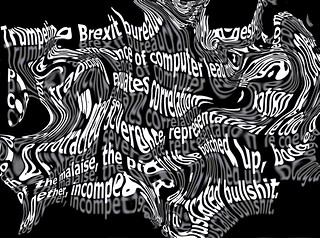I've noticed quite a few notable occurrences over the last few weeks; for me the common theme between them is, intrinsically, simulation. Okay, this is nothing new, far from it, but I think we can observe how the use of simulation has increased, affected our perception of reality and therefore our behaviour. Baudrillard waxed about simulation and simulacra decades ago and I am extraordinarily biased towards postmodern thought and enjoy the
notoriety that
my snippets of postmodern theory, artistic insights and philosophical quips afford me.
Then again, I am genuinely rather concerned about the impoverished method of science, our over-reliance on new technology and its effect upon us and the controlling mechanisms within society(ies) and the misinformation or disinformation that frequently pervades our lives. The established media, indeed so-called "quality publications" or "high quality broadcasters" spin opinion masquerading as fact to the point that the public are reacting to falsity, exaggeration, hyperbole and sensationalism rather than truth, or at least a reasonable attempt to report accurately and objectively.
Trump is undoubtedly one of the Kings of falsity or, if you will, fake news. Of course, he is the fake and continuing and exasperating investigations into his possible collusions with Russian interference in US elections, only serve to make a suspicious public more suspicious of his bizarre behaviour and his continued ham-fisted attempts to quash any allegations that may infer his involvement. But Trump is an oddity, a symptom of a high-capitalism and the USA's attempt to adapt to multiculturalism, globalisation and the emerging economies.
In the UK we have seen the rise of anti-Global Warming protests and Extinction Rebellion protests. Global warming may or may not be occurring, and if it is it may be a natural occurrence, it may have something to do with human behaviour or be a mixture of both. As ideas have become increasingly politicized it becomes difficult to admit that we don't really know what causes global warming (causes are potentially multifarious) or, indeed, whether it is occurring at all. My online attempts at discussion regarding global warming have resulted in a religious-like rejection of my questioning of the dogma that these these ideas have become. A simple opinion, reasoned, balanced and mature in nature can send people into a frenzy of anger, fear and upset. When I point to contradictions in theories regarding Global Warming or cover-ups in research that have, at times, indicating global cooling, some people are rude and offensive, others question my knowledge or sources as not being reputable. Essentially, the politicization of thought, the dogma of ideas has resulted in less democracy and liberty when it comes to the formation of and discussion of ideas.
Anti-Extinction protests, including childrens' mass demonstrations are, in my view, symptomatic of human perception being fragmented by hypereality and the false or exaggerated claims of a persistent media. We can forgive children for their naivety, and an interest in political/environmental events outside the classroom is useful for their development. However, adults don't have the excuse of immaturity and really should question the reliability of the information that fuels their protests. Not that this is always easy, when we are consistently bombarded with (dis)information. Indeed, I could wax about perceptual simulacra, "truth" being a representation of truth that becomes a subject in its own right, existing independently from truth. This statement is an exaggeration by myself and not entirely true. Fortunately I am conscious of this and not too proud to admit my error of thought or perception. Nonetheless, as I mentioned before, simulation has had a significant effect upon human perception and, consequently, our behaviour.
Not only do disasters come to our attention on a frequent basis, so do discoveries. The way many of these "discoveries" are reported makes them seem completely new and that some of the great questions of mankind have been answered, or our greatest fears are being realised. The M87 black hole "discovery" is problematic for many reasons, based around erroneous and sensationalist media reportage and the use of new technologies to create a simulated and conglomerate image of, what is deemed to be, a black hole. The representational image, put together by "artificial intelligence" may indicate that there is a black hole present in this distant galaxy, however it is not the conclusive proof that scientists and the media want us to believe. The M87 black hole is not a fact, it is a possibility perhaps even a probability, but certainly not a fact. It is not the existence of a black hole that bothers me, or conversely it's non-existence (forgive the astrophysical pun) rather more it is the dogmatic approach to evidence, the jejune reportage of possibilities as facts and the way in which the methods that were used in the observations were simply accepted as being conducive to accurately understanding physical reality.
Simulation is just that; a representation of reality, potentially a useful tool that helps us to perceive and comprehend something that is difficult to apprehend through the senses. Therefore the fact that the discovery is a simulation should have been reported, rather than the questionable notion that the discovery is factual evidence of the existence of a black hole. Both the scientific team and the media are to blame for this occurrence. The data collection through A.I, in this case an algorithm that collected data and merged it together to give an impression that makes it easier for us to perceive the findings as a black hole, should be thoroughly scrutinized before claims of factual, black hole discoveries are made. Are we certain that Artificial Intelligence has developed to such a level that it is helpful to scientific analysis and our perception, or is it actually a hindrance to our understanding, particularly when we are dealing with such distant galaxies, their huge size and such theoretical and rarefied phenomena as black holes?
The "discovery" of the M87 black hole is, essentially Katie Bouman, the Computer Science student who developed the algorithm that merged data and helped to form a simulated black-hole image. This may seem a farcical claim, and of course, my claim is fallacious but acts as a metaphor for the media coverage of the black hole discovery. The media obsessing on this young, attractive student and the dismissal of the rest of the team of scientists that she collaborated with, is an oddity of our times. As I mentioned before, the biases of the media are rife, sensationalizing and falsifying as they churn out huge quantities of information, regardless of such antiquated concepts as
impartiality, objectivity and, dare I say it,
facts.... An attempt at truth is anathema to post-modern disinformation, the politicization of ideas and High Capitalist ideals.
Political correctness policies also diminish an accurate comprehension of reality, reporting through the lens of legislation, fracturing truth into simulation and falsity. The emphasis on Katie Bouman, in my opinion reveals both a cultural shift from the natural sciences to applied science, namely new technologies, and the overarching power of overt legislation that gives a bias towards women in media reportage. The former is one cause of the poorer scientific research that we currently experience and the latter is, once again an example of simulation.
The image at the top of the post is an image of the simulated black hole in the M87 Galaxy via the Event Horizon telescope.
Simon April 2019

:format(webp)/cdn.vox-cdn.com/uploads/chorus_image/image/63386642/A_Consensus_sm.0.jpg)



